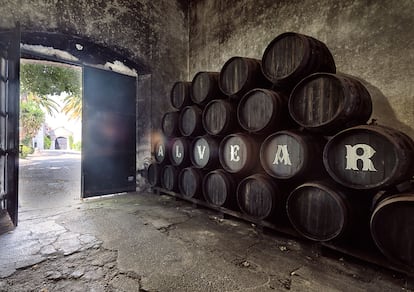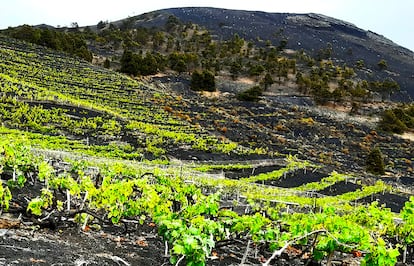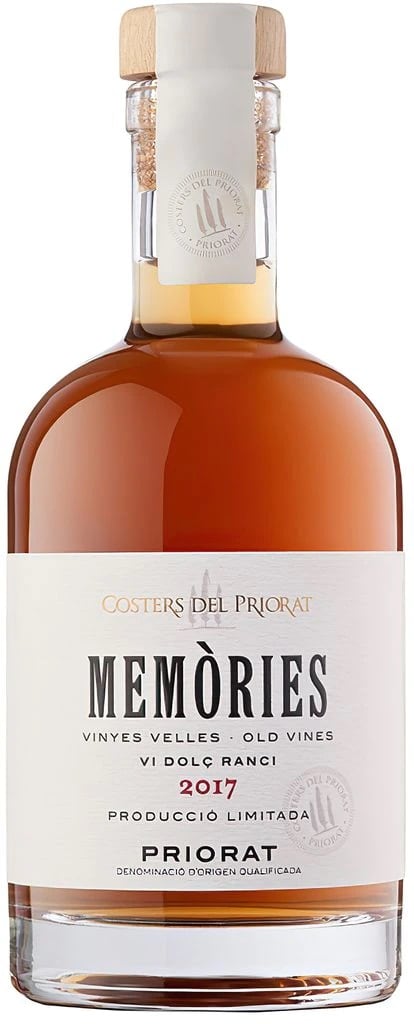Spain’s top dessert wines for an end-of-year celebration
These sweet drinks from across the Spanish geography are on a par with their more famous cousins from Sauternes, France and Tokaj, Hungary

Spanish dessert wines are unparalleled in their quality. They meet the caliber of famous “noble rot” wines (made with grapes affected by the fungus Botrytis cinerea, which in this case is a desired quality), such as those from Sauternes, France, and Tokaj, Hungary, not to mention the glorious German Eiswein or ice wine. Spain has a wide variety of sweet wine production techniques: solar systems, extended aging in fondillones, natural sun-drying, over-ripening on the vine and fortified wines, among others.

In addition to those techniques, the country’s wines include a range of varieties, from the time-tested Muscat, Malvasía and Pedro Ximénez to the local Treixadura, Godello, Monastrell, Grenache and Grenache blanc. There are wines for all palates: some have notes of perfume, flower honey and musk, others taste of raisins, fruitcake and dates, accompanied by an elegant touch of perfumed wood, roasted nuts and chocolate. Some are sumptuous and deeply flavored; others are light, svelte and slightly sour. The cast of sweet Spanish wines is large. This list includes some of the best selections from each category, all suitable to sweeten an end-of-the-year celebration.

Molino Real 2009
Origin: Málaga.
Type: Aged white, 13.5%.
Grape: Muscat of Alexandria.
Score: 9.5/10.
Tasting: Rioja winemaker Telmo Rodríguez demonstrates his mastery in all the wines he produces, including this Molino Real sweet Muscat, made from grapes grown on the steep slate soil slopes of the Montes de Málaga. It is fermented in 225-liter vats and aged for 20 months in French oak. Aromas of white flowers, candied fruit, honey, balsamic notes and spices that give it an unusual elegance. Deliciously sweet, expressive, fresh and long.

Majjan 2014
Origin: Costers del Segre.
Type: Aged sweet white, 12%.
Grapes: Sauvignon Blanc and Semillon.
Score: 9.6/10.
Tasting notes: Raúl Bobet climbed the Lleida Pyrenees to find the ideal location for his Castell d'Encús winery. This Majjan comes from mountain vines a thousand meters above sea level, planted on gentle slopes surrounded by forests. It has a complex and evocative aroma loaded with perfumes of fruit compote, floral touches, hints of candied orange and elegant notes of cinnamon and smoked vanilla. Very tasty and fresh, it ends with a subtly syrupy aftertaste.

Edetaria Dolç de Garnacha Blanca 2021
Origin: Terra Alta.
Type: blanco dulce, 13%.
Grape: Grenache blanc.
Score: 9.6/10.
Tasting notes: Agronomist Joan Angel Lliberia is a Grenache blanc magician. With this wine he has recovered the forgotten tradition of late harvests in Terra Alta. After the harvest, the overripe grapes are frozen, pressed and fermented. The wine concentrates complex and evocative aromas of ripe fleshy fruit, citrus notes and white flowers. Elegant, creamy, slightly honeyed, it has a long, persistent taste and a fresh final sensation.

Alvear Pedro Ximénez de Sacristía 2006
Origin: Montilla-Moriles.
Type: Fortified white, 15%.
Grape: Pedro Ximénez.
Score: 9.6/10.
Tasting notes: Alvear is one of Montilla’s oldest wineries and its most prestigious. It is known for the excellent old Pedro Ximénez vines. Once sun-dried, the best Pedro Ximénez harvests are aged in American oak barrels from the Sacristía winery. This is a wine of exceptional value, full of aromas of raisins, fruit in liqueur, citrus, chocolate and spices. Very tasty, concentrated and thick, without being cloying, it leaves a sweet sensation, as elegant as it is intense.

Memòries Dolç Ranci 2021
Origin: Priorat.
Type: Aged sweet red, 16%.
Grape: Grenache blanc,
Score: 9.7/10.
Tasting notes: Memòries is made from very old white Grenache vines. Its deep aromas immerse us in a magical experience: strawberry jam and fleshy fruit dialogue with dried figs, flower honey, smoky and spicy notes, nuts and toffee caramel. Tasty, smooth, with good acidity and a long finish.

Chivite Colección 125 Vendimia Tardía 2019
Origin: Navarra.
Type: Aged white, 14.5 %.
Grape: Small-grain Muscat.
Score: 9.7/10.
Tasting notes: Chivite is a pioneer in late-harvest Muscats. The harvest is staggered in order to use perfectly overripe grapes, which ferment partially in Allier oak and then age for nine months with their own lees. Great aromatic complexity of sandalwood, dried fruit, honey and sweet spices, with an elegant background of cedar. A delicious palate of fresh, silky sweetness, notably persistent.

Casta Diva Reserva Real 2002
Origin: Alicante.
Type: Blanco reserva, 14.5 %.
Grape: Muscat of Alexandria.
Score: 9.7/10.
Tasting notes: Felipe Gutiérrez de la Vega has created some of Spain’s best sweet wines, including this Muscat. Reserva Real comes from a small vineyard on the sea, with strains over 60 years old. It is manufactured with mature dried grapes, fermented in French oak and aged for 18 months. Aroma of caramel, flower petals, citrus, musk, nougat, brioche and spices. Creamy and fresh, its smooth sweetness fills the palate with Mediterranean resonance.

Noé
Origin: Jerez.
Type: Sweet white, 15.5%.
Grape: Pedro Ximénez.
Score: 9.8/10.
Tasting notes: Noé is an example of the magic of Jerez’s wineries and their extraordinary capacity to transform a common must into a powerful wine. This is a complex, bold wine, with an aroma of dried fruit, dates, dried figs, coffee and roasted nuts. Delicately grassy, velvety, powerful, concentrated, intense, without being overwhelmingly sweet.

Colección Vivanco Dulce de Invierno 2019
Origin: Rioja.
Type: Sweet red, 13.5%.
Strains: Tempranillo, Graciano, Grenache, and Mazuelo.
Score: 9.2/10.
Tasting notes: Rafael Vivanco pays homage to the traditional supurado wines with a late harvest of the four classic Riojan varieties par excellence, grown in the vineyards of Finca El Cantillo. The musts ferment separately in French oak barrels, with subsequent aging for 12 months. It has intense and complex aromas of wild fruit and compote, notes of candied orange, flowers, toffee, wood and spices. It has the lively freshness of citrus fruit and a sweet raisin finish.

Malvasia Aromática Teneguía 2020
Origin: La Palma.
Type: Sweet white, 16%.
Strains: Malvasia.
Score: 9.2/10.
Tasting notes: La Palma, a tropical island of great beauty, allows Malvasia to develop over a very long vegetative cycle, which gives the wines an unbeatable fragrance and complexity, especially in the Los Quemados area. This is where this late harvest of hundred-year-old vines comes from. Its fragrant aroma of fruit jam, citrus, flower petals, honey and balsamic herbs stands out. Its sweetness and acidity lengthen an expressive and fresh finish.

V Dulce de Invierno 2020
Origen: Rueda.
Type: Aged sweet white, 10%.
Grapes: Verdejo and Gorda de Moldavia (Muscat).
Score: 9.3/10.
Tasting notes: Javier Sanz has recovered family tradition to make his sweet winter wine, through a laborious process that includes the natural drying and subsequent freezing of the Verdejo grapes and late-harvest Muscat. The final product is rounded off in French oak barrels. The wine displays a seductive aroma of fleshy dried apricots, with notes of caramelized citrus peel, figs, and elegant hints of wood and sweet spices. Slightly honeyed, it has an excellent sweet-bitter balance, making it expressive and balanced.

Fondillón Brotons Gran Reserva 1964
Origin: Alicante.
Type: Tinto dulce generoso, 20.5%.
Grape: Monastrell.
Score: 9.5/10.
Tasting notes: Roberto Brotons has a treasure trove of fondillón barrels, relics that take their name from the bottom of the vat where the wine is concentrated after long years of aging and resting. The fondillón wines are made by hand with hundred-year-old overripe Monastrell vines from its 45-hectare vineyard located in the Caserío del Culebrón. It is a red with a deep aromatic profile, powerful aromas of raisined fruit, nuts, dried carob and an elegant background of old wood, with a warm and intense flavor.
Sign up for our weekly newsletter to get more English-language news coverage from EL PAÍS USA Edition
Tu suscripción se está usando en otro dispositivo
¿Quieres añadir otro usuario a tu suscripción?
Si continúas leyendo en este dispositivo, no se podrá leer en el otro.
FlechaTu suscripción se está usando en otro dispositivo y solo puedes acceder a EL PAÍS desde un dispositivo a la vez.
Si quieres compartir tu cuenta, cambia tu suscripción a la modalidad Premium, así podrás añadir otro usuario. Cada uno accederá con su propia cuenta de email, lo que os permitirá personalizar vuestra experiencia en EL PAÍS.
¿Tienes una suscripción de empresa? Accede aquí para contratar más cuentas.
En el caso de no saber quién está usando tu cuenta, te recomendamos cambiar tu contraseña aquí.
Si decides continuar compartiendo tu cuenta, este mensaje se mostrará en tu dispositivo y en el de la otra persona que está usando tu cuenta de forma indefinida, afectando a tu experiencia de lectura. Puedes consultar aquí los términos y condiciones de la suscripción digital.









































